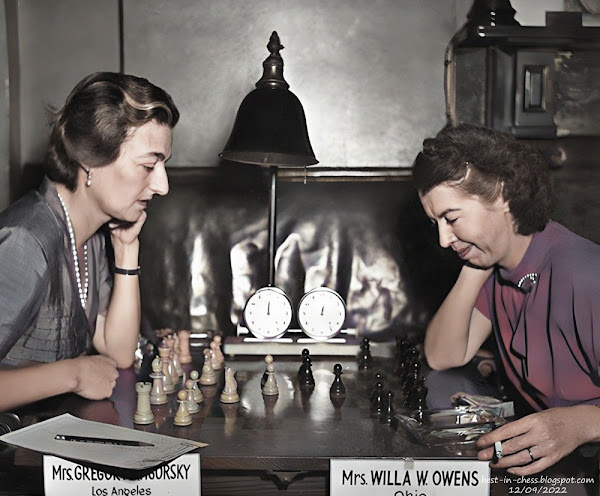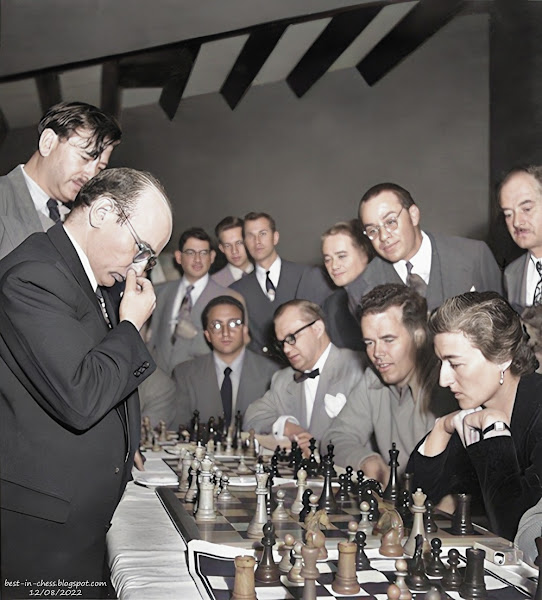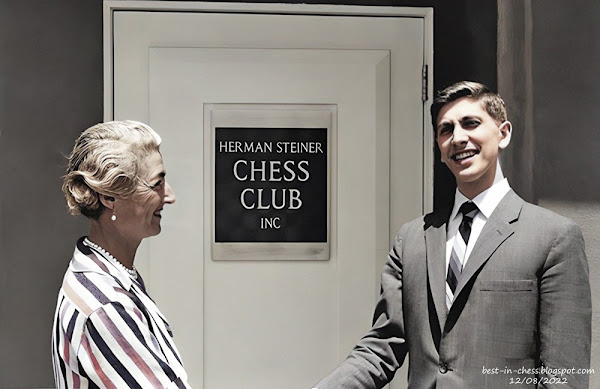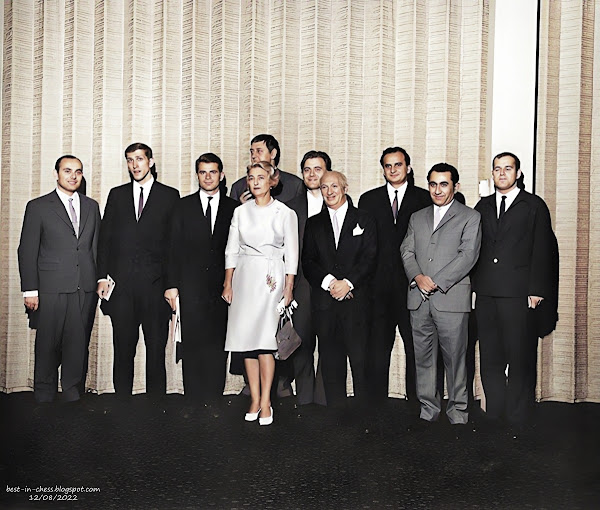Additional Games
- Chessgames
- Game, Solomon vs. Jacqueline Piatigorsky, Hollywood Chess Championship Class, 1951.
- Game, Jacqueline Piatigorsky vs. Zeitlin, Hollywood B. Championship Tournament, 1951.
- Game, Jacqueline Piatigorsky vs. Al Russo, County League Games, 1951.
- Game, Jacqueline Piatigorsky vs. Dr. Edward Kupka, California Open Championship, 1951.
- Game, Henry Gross vs. Jacqueline Piatigorsky, California Open Championship, 1951.
- Game, Jacqueline Piatigorsky vs. H. Rosenbaum, California Open Championship, 1951.
- Game, Jacqueline Piatigorsky vs. Mary Bain, U.S. Womens' Championship, 1951.
- Game, Jacqueline Piatigorsky vs. Lina Grumette, U.S. Womens' Championship, 1951.
- Game, Jacqueline Piatigorsky vs. William Wheeler, Los Angeles County Championship, 1951.
- Game, Sven Elias Almgren vs. Jacqueline Piatigorsky, County Championship, 1952.
December 1951
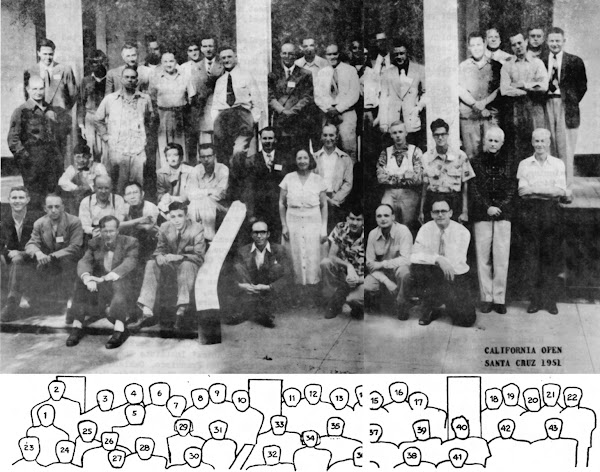 Vol. 1, No. 6, December 1951, California Chess Reporter: California Open, Santa Cruz 1951
Vol. 1, No. 6, December 1951, California Chess Reporter: California Open, Santa Cruz 1951January 27, 1952
1955
December 1956
 Vol. 6, No. 5, California Chess Reporter, December 1956, (Left to Right) Olga Higgins, Henrietta Page, Sonia Graf, Jacqueline Piatigorsky, Estelle Wagner, Lena Grumette, Clara Hurt, Lenore Ralston.
Vol. 6, No. 5, California Chess Reporter, December 1956, (Left to Right) Olga Higgins, Henrietta Page, Sonia Graf, Jacqueline Piatigorsky, Estelle Wagner, Lena Grumette, Clara Hurt, Lenore Ralston.April 03 1961

 Cellist 03 Apr 1961, Mon The Los Angeles Times (Los Angeles, California) Newspapers.com
Cellist 03 Apr 1961, Mon The Los Angeles Times (Los Angeles, California) Newspapers.com
July 1963
1966
July 22 2012
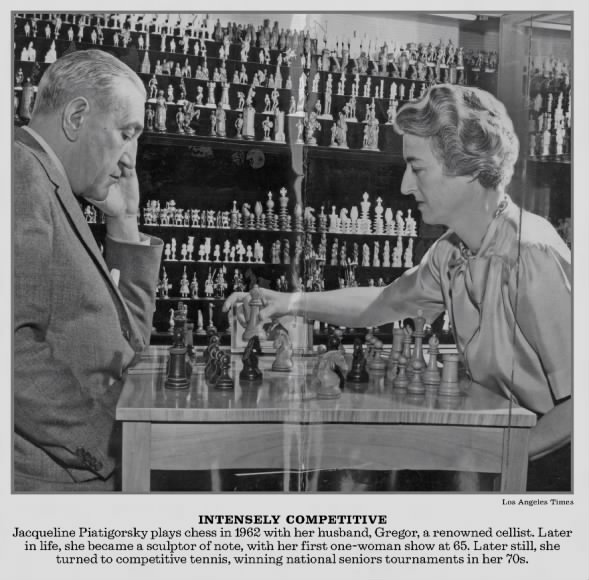 Intensely Competitive 22 Jul 2012, Sun The Los Angeles Times (Los Angeles, California) Newspapers.com
Intensely Competitive 22 Jul 2012, Sun The Los Angeles Times (Los Angeles, California) Newspapers.com
INTENSELY COMPETITIVE
Jacqueline Piatigorsky plays chess in 1962 with her husband, Gregor, a renowned cellist. Later in life, she became a sculptor of note, with her first one-woman show at 65. Later still, she turned to competitive tennis, winning national seniors tournaments in her 70s.
 Jacqueline Piatigorsky, 1911-2012 22 Jul 2012, Sun The Los Angeles Times (Los Angeles, California) Newspapers.com
Jacqueline Piatigorsky, 1911-2012 22 Jul 2012, Sun The Los Angeles Times (Los Angeles, California) Newspapers.com
Jacqueline Piatigorsky, 1911-2012
Chess champion, tournament sponsor
By Elaine Woo
Jacqueline Piatigorsky was born into the Rothschild banking clan and grew up in a palace in Paris, but her silver spoon came with a ball and shackles. She rarely left her sumptuous homes and was dominated by a callous nanny. She felt invisible to her parents, who expected little of their sensitive, socially awkward daughter except to marry well. “I was a disappointment,” she wrote, “a shrinking, misunderstood child.”
She was also intensely competitive by nature — and driven to be more than a poor little rich girl. After a failed first marriage, she found bliss as the wife of renowned cellist Gregor Piatigorsky and raised a family in Los Angeles.
Then, starting in her 40s, she turned a childhood obsession into a string of impressive achievements: She became a U.S. chess champion — among the top five female players in the nation in the 1950s and ’60s — as well as an influential patron of the game, whose Piatigorsky Cup tournaments drew more international grandmasters than any U.S. competition in decades.
Later in life, she became a sculptor of note, with her first one-woman show at 65. Later still, she turned to competitive tennis, winning national seniors tournaments in her 70s. She pursued both interests well past her 90th birthday.
“She was a great striver,” said Laurence Lesser, former president of the New England Conservatory of Music, who knew Piatigorsky for 60 years. “She was always pushing herself and others around her to do more.”
Piatigorsky was 100 when she died July 15 at her longtime Brentwood home. The cause was complications of pneumonia, said her son, Jorem.
Born Jacqueline de Rothschild on Nov. 6, 1911, she was the middle child of Baron Edouardde Rothschild and his wife, Germaine Alice Halphen.
She spent her childhood in the Talleyrand Mansion, which is now part of the U.S. Embassy complex in Paris, and at Château de Ferrières, an immense country estate with lakes, parks, a private zoo and decor courtesy of Van Dyke and other old masters.
She had an older brother, Guy, and a younger sister, Bethsabée, whom she did not meet for three years because their nannies hated each other. Later, they shared a nanny, who favored the younger girl over Jacqueline.
As for her parents, Jacqueline saw them by appointment. Their quarters were so far from the nursery that “visits to them seemed expeditions,” Piatigorsky wrote in her 1988 memoir, “Jump in the Waves.” Timid and swarmed by servants, she was in a perpetual state of confusion and fear; her mother regarded her as “a loser.”
At 18, she escaped her parents’ world by marrying Robert Calmann-Lévy, whose father was Marcel Proust’s publisher. The marriage quickly went sour, especially after Jacqueline learned her money was supporting his mistress.
She was 24 when she met Gregor Piatigorsky, a Russian-Jewish cellist who was in Paris for a recital. They were married in 1937. Their daughter, Jephta, was born later that year.
Fearing the Nazi invasion, they fled France in 1939 and settled in Elizabethtown, N.Y., where their son was born in 1940.
Piatigorsky was devoted to her children but felt “a burning desire to do something myself.”
She taught herself to play the bassoon and joined an amateur orchestra; she also learned to pilot a plane.
But her “real love” was chess, taught to her by a nurse when she was 6 and recovering from peritonitis. One winter in New York, she took up postal chess, exchanging moves by mail with far-flung opponents in tournaments that took a year to complete.
She continued to play after the family moved to Philadelphia and, in 1949, to Los Angeles, where Gregor had accepted a teaching position at USC. She played with everyone from her gardener to luminaries in the artslike Marcel Duchamp and Sergei Prokofiev. She tackled the weekly chess problems in the Los Angeles Times and met chess editor Herman Steiner, who became her teacher and entered her in her first face-to-face tournament.
In 1957 she represented the U.S. at the first Women’s Chess Olympiad in Emmen, the Netherlands, and earned a bronze medal. She finished second in the U.S. Women’s Championship in 1965.
Seeing the shabby conditions under which most tournaments were held, she became an organizer and sponsor of chess events.
[One of her earliest efforts — a 1961 match between U.S. champions Samuel Reshevsky and Bobby Fischer — ended abruptly after Irving Rivise demanded game time start earlier than agreed so that Rivise could attend to the U.S. Open in San Francisco. Fischer was justifiably offended and withdrew from the competition, allowing his opponent to be declared the winner.]
More successful was the first Piatigorsky Cup tournament, held in 1963 in a mirrored ballroom at the Ambassador Hotel in Los Angeles. Its $10,000 prize was the richest in chess history at the time and drew eight grandmasters, including the first Soviet world champion allowed to travel to the U.S., Tigran Petrosian. He and Paul Keres, another Soviet champion, tied for first.
The second Piatigorsky Cup contest in 1966 drew 10 international grandmasters and, at 1,300, the largest crowd that had ever watched a chess match in this country.
Piatigorsky not only provided the $20,000 prize but devised an innovative system for relaying moves from the stage to the analysis room. She also vacuumed the carpet in the ballroom at the Miramar Hotel in Santa Monica where the tournament was held, escorted observers to their seats and policed the crowd. Fischer, who had boycotted the 1963 tournament, finished a close second to Boris Spassky.
Jack Peters, who wrote The Times’ chess column for 20 years, said last week that the 1966 contest “might still rank as the best American tournament ever” because of the high level of chess by several of the game’s greatest players.
Piatigorsky never held a third tournament but left a large legacy. “The two Piatigorsky Cup tournaments, along with the ascent of Bobby Fischer on the international scene, did a great deal to popularize chess in the U.S. and legitimize it as a sporting as well as intellectual activity,” said Randall Hough, a chess master and former member of the U.S. Chess Federation’s board.
The chess benefactor also introduced thousands of youths to the game by sponsoring public school chess clubs throughout Southern California and the U.S. Junior Invitational, which produced several future grandmasters.
She remained a fierce competitor until two months ago, when she became ill. “The moment she started a game she was five or six moves ahead,” said Ianka Petrova, her caregiver and frequent chess partner. “It was almost impossible to beat her until the end.”
Her husband, Gregor, died of lung cancer in 1976. In addition to her children, she is survived by five grandchildren and 10 great-grandchildren.
December 20 1988
 Jacqueline Piatigorsky 20 Dec 1988, Tue The Journal News (White Plains, New York) Newspapers.com
Jacqueline Piatigorsky 20 Dec 1988, Tue The Journal News (White Plains, New York) Newspapers.com
Jacqueline Piatigorsky, 77, with marble busts she sculpted of her late husband, renowned cellist Gregor Piatigorsky.
December 01 2014
 Jacqueline and Gregor Piatigorsky 01 Dec 2014, Mon The Los Angeles Times (Los Angeles, California) Newspapers.com
Jacqueline and Gregor Piatigorsky 01 Dec 2014, Mon The Los Angeles Times (Los Angeles, California) Newspapers.com
JACQUELINE and Gregor Piatigorsky in 1975. She was a chess wizard, tennis champion and sculptor. — Los Angeles Times











